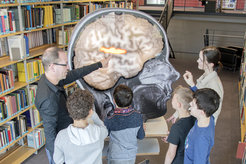Heavy metal and brains: More than 160 pupils at Future Day
What happens in our brain while we think? Why does it become more and more exhausting for the brain to remember something as you get older? And what do heavy metal music and the brain have in common? These are questions to which more than 160 pupils got answers at this year's Future Day at the MPI CBS.

"Magnetic resonance imaging can be compared to heavy metal," explains Robert Trampel, a neurophysicist at the MPI CBS. In his interactive lecture on MRI at today's Future Day, with speakers blaring, he explained, “Both are not only loud but in some cases use equipment that weighs tons”. “Similar to headbanging, the changing magnetic field during an MRI scan ensures that the protons in our heads circle around their axis at different speeds", says Trampel, himself a heavy metal fan.
Just a few metres away, neuroscientists Misun Kim and Irina Barnaveli explain how virtual reality can be used to study how we perceive our surroundings, and control our actions. And a little further on, in the neurobiology sound lab, it's about how we process tones and sounds in the brain.
MRI, virtual realities, sound: these are only three of the topics to which doctors, psychologists, physicists, and programmers at the MPI CBS invited interested pupils to explore. The young people also encountered experiments with language, behavior, and imagination, or wandered into enigmatic book worlds and along super-fast data highways.
"We were happy to welcome the young generation and get them excited about brain research," says Anahit Babayan, Equal Opportunities Officer at MPI CBS and one of the organizers of the day of action. "We hope that some of them will go home with the idea of becoming a scientist." In particular, she wants to motivate girls to pursue their dream of becoming a scientist and embark on the path to research.
Thirty pupils from Leipzig and Halle visited the MPI CBS on site. More than 130 others joined virtually from cities across Germany and even other countries, including Armenia. Science, it was shown once again, knows no borders. Anahit Babayan adds: "We are happy to be able to openly share our scientific experiences with the new generation around the world."












